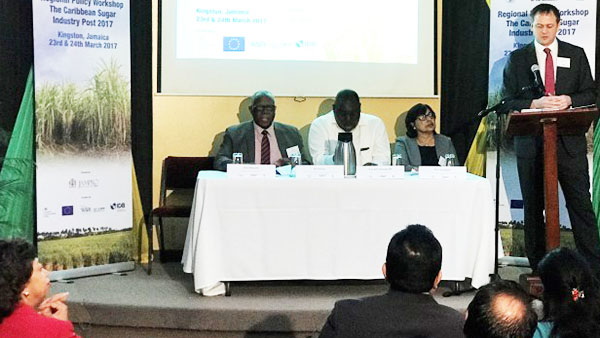KINGSTON, Jamaica, March 28, 2017 (CMC) – Caribbean stakeholders say it is time regional countries provide some level of protection to the regional sugar industry, even as they acknowledge the need to modernise the sector as impending changes in Europe could result in a drop in the price for the commodity.
A joint statement — issued by the Sugar Association of the Caribbean and the Caribbean Council, following a two-day meeting that examined the Caribbean Sugar Industry Post-2017 — noted that the region needed to “urgently refocus our attention on our own market in the region.
“Governments around the world give tariff protection to their own sugar industries yet, in the Caribbean, we are currently losing out to imported sugar from outside the region. It is time to modernise our approach to sugar.
“The net cost effect of tariff protection to consumers will be negligible, but it will give our industry the ability to attract investment, mechanise the industry and provide quality jobs and a sustainable future for the sector.
“We urge our Ministers to adopt the recommendations in the industry position paper we have published today, and to take back control of the destiny of the industry. The industry stands ready to play its part, and we have set out the ways in which we will work to create new efficiencies and productivity across the sector,” the joint statement noted, following the meeting that ended here, over last weekend.
The two-day meeting was held in collaboration with the Caribbean Council, the Guyana-based Caribbean Community (CARICOM) Secretariat and the Jamaica Promotions Corporation (JAMPRO).
It was funded by the European Union, the UK Foreign and Commonwealth Office, ASR Group and the Inter-American Development Bank (IDB), and brought together industry leaders and policy makers for an in-depth discussion on how the Caribbean sugar industry now needs to adapt to the new market realities.
Delegates also discussed the policy options which are available to both industry and regional governments.
The recommendations of the industry workshop were presented to the Sixth Meeting of the CARICOM Stakeholders on Sugar, held here last Friday.
Managing Director of the Caribbean Council, Chris Bennett, said the “exciting range of ideas and opportunity which have been presented by Caribbean industry specialists …demonstrates that Caribbean sugar can be a modern and high value component to the 21st century Caribbean economy.
“The framework for trade needs to be modernised also, to reflect that the Caribbean no longer can, or should, depend on the EU market as a guaranteed buyer.
“The trade and tariff policies required are straightforward and applied all around the rest of the world. There is an urgent need for the Caribbean Single Market and Economy to put in place the equivalent protections as soon as possible,” he added.
Earlier, a senior official of the CARICOM Secretariat had warned that the ability of the sugar industry in the region to survive, after the removal of production quotas in the European Union on September 30, will depend on improved competitiveness and pragmatic diversification options.
The end of the EU’s quota management for sugar is expected to lead to a fall in prices towards the international sugar price and a decrease in sugar imports from the African Caribbean and Pacific (ACP) states, with particular impact on Caribbean producers.
CARICOM Secretariat Program Manager, Agriculture and Industry, Nisa Surujbally, said that securing more remunerative markets, value addition and an enabling policy regime within the CSME were also very important to the industry’s survival.
“We have witnessed major structural changes in the operations of our sugar industries, including the exit from sugar production of two member states, Trinidad and Tobago and St. Kitts and Nevis. Nevertheless, we are mindful of the vital role and contribution of the sugar sectors to the economies of Barbados, Belize, Guyana and Jamaica.
“Survivability of these industries, after the removal of production quotas in the EU on September 30 2017, will, in no small measure, be a function of improved competitiveness, securing more remunerative markets, value addition, an enabling policy regime within the CARICOM Single Market and Economy, and, not lastly, practical and pragmatic diversification options.
“I say this as a technical official, while being acutely aware of the emotional associations we have with our region’s oldest economic sector. This industry is responsible for us being here and has coloured our history from colonisation, to slavery to indentureship and to independence. It is not an easy time. Now is crunch time,” she said.
 Pride News Canada's Leader In African Canadian & Caribbean News, Views & Lifestyle
Pride News Canada's Leader In African Canadian & Caribbean News, Views & Lifestyle





